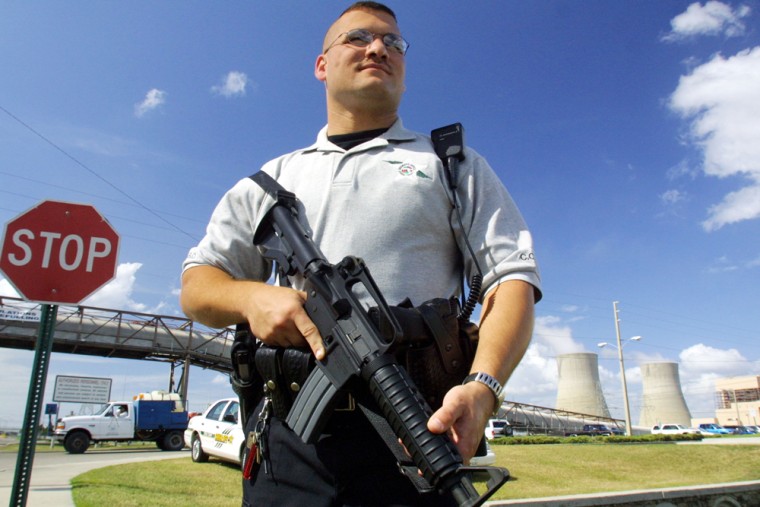All across the country Americans are fighting terrorism, one utility bill at a time.
Public utility companies from sea to shining sea have spent hundreds of millions requisitioning, reviving or retro-fitting security measures in the aftermath of the Sept. 11 terrorist attacks. And now these companies want their money back, most of it in the form of higher rates for their customers.
The federal government stepped in quickly after 9/11 and set precedent for allowing such rate increases. Two days after the terrorist attacks in 2001, the Federal Energy Regulatory Commission, which regulates rates for wholesale electricity and natural gas shipments, told companies it would approve costs to upgrade security. The commission followed up with an order that defined the expenses as “prudently incurred costs necessary to further safeguard the reliability and security of our energy and supply infrastructure.”
“From a homeland security perspective, I think you would want to make certain your critical infrastructures are protected,” said Jeffery Pillon, a staff member for Michigan’s Public Service Commission. “And if the companies, at their own initiatives, or based on some industry guidance, take action to increase security, again as long as the costs are reasonable, that would give you at least a basis for allowing those expenditures to be included in rates,” said Pillon, who also is chairman of a critical infrastructure subcommittee for the National Association of Regulatory Utility Commissioners.
State regulatory bodies oversee and set prices for most utilities and decide whether to grant rate increases in a series of hearings known as “rate cases." The proceedings mirror court cases: Exhibits are introduced and experts are called to support and rebut claims. Transcripts often run into the thousands of pages.
When all is said and done, it can be difficult to determine how much of a customer's gas, electric or water bill is attributable to security costs in the wake of 9/11, according to utility officials.
Typically, security costs are only a small part of a rate increase request, some of which run into the millions. "No one’s really quite split [costs] out like that," Pillion said. "To do that you’d have to get the green eye shades out and go back into the cases."
There is no one-size-fits-all security plan for utilities. Security measures, even within the same industry, can vary from region to region, experts say. Extra security measures run the gamut, from installing better padlocks, heavier chains, elaborate motion detection devices and complex cyber-security systems to extensive construction projects to "harden" critical infrastructure.
Many companies are reluctant to subject their security strategies to the public scrutiny of an open hearing. But some cases on the books provide an early look at security costs:
- In Pennsylvania, American Water won a $30 million rate increase that included some incremental security costs attributed to 9/11, said spokesman Paul Foran. The typical monthly residential water bill for a customer in Pennsylvania is $38 per month; of that about 92 cents can be traced to enhanced security costs, Foran said.
- In Michigan, Consumers Energy Co. won approval for higher rates to pay for $24.5 million in security measures at its nuclear plant. The improvements were required under federal guidelines and nuclear plants across the country are seeking rate increase to cover similar expenses.
- Utilities in Iowa won rate increases for $1.6 million in security costs. Iowa-based MidAmerican Energy, which serves 460,000 people in the state, won a gas rate case that included $780,375 in security costs, which added just 27 cents per year to consumers' bills, a company spokesman said.
No rubber stamp
State regulators insist that increases are not automatically approved, and consumer advocates are watching cases closely.
“The position of the consumer advocate would be, clearly, we want security,” said Janine Migden-Ostrander, head of Ohio Consumer’s Counsel. “But we want to make sure that the actual expenditures are just and reasonable if the utility is going to have consumers pay for them.”
The National Association of Regulatory Utility Commissioners (NARUC) issued a white paper on the subject that says "state commissioners are also sensitive to not creating an incentive for carte blanche expenditures on security, which in turn end up directly in higher rates.”
A study by the National Regulatory Research Institute, the official research arm of the NARUC, found that utilities in 22 states have filed to recover security costs; meanwhile, utilities in another 11 states are aware of security costs but have not yet filed to recover them.
Pillon says one reason may be that some utilities have “rediscovered” security procedures in place but not rigorously enforced.
“Making sure the gates were locked, employees carrying proper security badges, whatever it might be, you get some pretty big bang for your buck by implementing those kinds of things and they don’t cost a lot of money,” Pillon said.
Compromise ahead of recovery
Some utilities, like Oklahoma Gas & Electric, have put off security investments until state regulators will assure the companies that they can include them in their rates.
After two years of negotiations, the Oklahoma Corporation Commission, the state regulatory agency, is expected to rule soon on OG&E's request.
“This is more or less OG&E getting ahead of the curve, saying we would like to make these expenditures but we would like to do so knowing that we are going to be able to recover those costs,” said Brian Alford, a company spokesman.
Alford said the utility also worked with the state’s largest consumer groups to reach a compromise proposal that everyone could live with.
“We have worked through a number of issues about what types of expenditures we need to make, what are prudent expenditures," he said.
As a result of the lengthy dialogue, OG&E’s initial request for $40 million in security improvements was cut to $19 million. If approved, the expenditures would be phased in over the course of several years and eventually add 37 cents to the average residential bill, Alford said.
